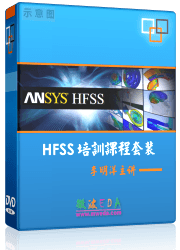- 易迪拓培训,专注于微波、射频、天线设计工程师的培养
HFSS15: ANSYS Workbench Integration Overview
ANSYS Workbench Integration Overview
ANSYS Workbench combines the strength of its core product solvers with the project management tools necessary to manage project workflow. In ANSYS Workbench, analyses are built as systems, which can then be combined into a project. The project is driven by a schematic workflow that manages the connections between the systems.
From the schematic, you can interact with applications (called workspaces) that are native to ANSYS Workbench and that display within the ANSYS Workbench interface. Native workspaces include: Project Schematic, Engineering Data, and Design Exploration (Parameters and Design Points).
You can also launch applications that are data-integrated with ANSYS Workbench, meaning the application’s interface remains separate, but the data from the application communicates with the native ANSYS Workbench data. Thus, data can be passed back and forth between any ANSYS Electromagnetics product on a Workbench Project Schematic and any supported ANSYS or ANSYS Electromagnetics desktop product. Depending on the application, data integration can include basic actions such as saving projects, as well as more complex actions such as the coupling of ANSYS Electromagnetics product variables to Workbench Design Exploration parameters.
Data-integrated applications include the following ANSYS Electromagnetics products: Designer 8.0, HFSS 15.0, Maxwell/RMxprt 16.0, Q3D Extractor 12.0, and Simplorer 11.0.
Note | For detailed information on working with ANSYS Workbench, please refer to the Workbench documentation. |
Integrating ANSYS Electromagnetics Products with ANSYS Workbench 15.0
Workbench Data Integration Overview
ANSYS Electromagnetics - ANSYS Multiphysics Coupling
ANSYS Electromagnetics CAD Integration Through Workbench
ANSYS Electromagnetics to ANSYS Geometry Transfer
User Defined Model (UDM) for ANSYS WB Integration
Stress Feedback to HFSS Using Workbench
Feedback Iterator
HFSS 学习培训课程套装,专家讲解,视频教学,帮助您全面系统地学习掌握HFSS
上一篇:Anisotropic Materials
下一篇:Apply an Orientation to the Current View


